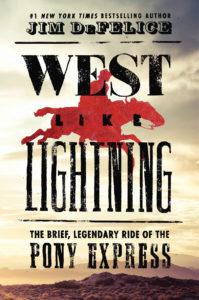By: Jim DeFelice, Author, “West Like Lightning: The Brief, Legendary Ride of the Pony Express” (2018, William Morrow/HarperCollins Publishers)
 The words “Pony Express” conjure romantic images of adventure and adrenaline-fueled action across the immense, varied terrain of the Old West. Wiry young men lean against the necks of their valiant steeds, racing against time and nature in a quest to deliver information.
The words “Pony Express” conjure romantic images of adventure and adrenaline-fueled action across the immense, varied terrain of the Old West. Wiry young men lean against the necks of their valiant steeds, racing against time and nature in a quest to deliver information.
But besides the romance and nostalgia, the words imply failure as well. While the Pony riders had an impeccable record—all of the service’s mail, even a bag apparently “captured” during an Indian War, was delivered—they were doomed from the start by the inevitable march of progress. The service’s creators were wild-eyed visionaries years behind the times, and poor businessmen to boot.
As I try to show in my book, “West Like Lightning,” a lot of that image is wrong. Not the romance, or the adventure, or the race against time. That’s all spot on. Yes, there are exaggerated legends associated with the Pony, but no more than any other important venture in our country’s history. Those legends deserve to be enjoyed and even celebrated; they tell us as much about ourselves today as about the past.
The image that’s wrong has to do with the founders, Alexander Majors, William Waddell, and most especially William Russell. Close examination reveals that while they may have been visionaries—Russell especially—they were not necessarily bad businessmen. They may have reached a bit too far, but that’s hardly uncommon in American history.
To really understand the Pony Express, you have to step back and look at the enterprise it was part of, which included everything from banks to long-haul freight lines. The trio were attempting to establish an empire that could deliver everything from information to physical goods from ocean to ocean. Not only were they aware of the technologies that supposedly doomed the Pony Express—the telegraph and railroads specifically—but they incorporated them in their plan, and in the Pony service itself.
Of course, there’s a lot more to the story—a book’s worth, at least—but their idea wasn’t necessarily doomed from the start. The Pony itself was designed as a short-term loss leader and public relations effort; it succeeded on both counts. But politics, the coming war, bad luck, and, yes, critical overreaching doomed the parent enterprise.
An idea ahead of its time? Maybe. But an even older and very similar enterprise remains with us today—American Express. Then there’s Wells Fargo, a competitor with a slightly different business plan, deeper pockets, and better political connections.
Who knows? Had Russell et al succeeded, it’d be the Pony Express we wouldn’t leave home without.
Fortunately for us, we still have the legends and romance to fall back on. The colorful characters—Wild Bill, Jack Slade, Buffalo Bill Cody, and a host of others—ride again in the stories of the Pony. It’s surprising how many figures of the Old West and American history crossed paths with the service. Even Mark Twain. Alongside those figures are other men, and a few women, who though their names may not conjure visions, formed the solid backbone of the service and ultimately the country.
I try to celebrate them all in “West Like Lightning.” Because the Pony Express riders did win their race against time, after all—we’re still telling their stories today, and celebrating their values of grit and determination, speed and endurance, as our own.
Jim DeFelice is the New York Times best-selling author of “West Like Lightning,” “American Sniper,” and “Every Man a Hero,” among other books. “West Like Lightning” was a Western Writers of America Spur Award finalist in the Best Western Historical Nonfiction category. His narrative history of the Pony Express was published in 2018, the 50th Anniversary of the National Trails System Act and 40th anniversary of the incorporation of the National Pony Express Association. DeFelice was invited to speak at the kickoff celebration of the annual re-ride in Old Sacramento, CA on June 20, 2018. This year’s westbound re-ride will be held June 10-20, 2019 starting in St. Joseph, MO.
Unless otherwise indicated, all material in Pathways Across America is public domain. All views expressed herein are perspectives of individuals working on behalf of the National Trails System and do not necessarily represent the viewpoint of the Federal agencies.